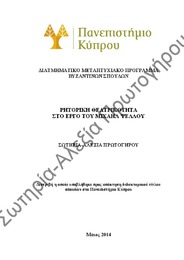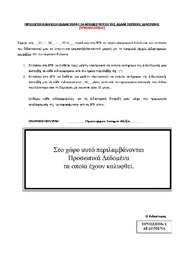| dc.contributor.advisor | Αγαπητός, Παναγιώτης | el |
| dc.contributor.author | Πρωτογήρου, Σωτηρία-Αλεξία | el |
| dc.coverage.spatial | Κύπρος | el |
| dc.coverage.spatial | Cyprus | en |
| dc.creator | Πρωτογήρου, Σωτηρία-Αλεξία | el |
| dc.date.accessioned | 2014-07-15T10:09:09Z | |
| dc.date.accessioned | 2017-07-28T09:25:27Z | |
| dc.date.available | 2014-07-15T10:09:09Z | |
| dc.date.available | 2017-07-28T09:25:27Z | |
| dc.date.issued | 2014-06 | |
| dc.date.submitted | 2014-06-02 | |
| dc.identifier.uri | https://gnosis.library.ucy.ac.cy/handle/7/38953 | en |
| dc.description | Περιέχει βιβλιογραφία (σ. 296-327) και ευρετήριο πρωτογενών πηγών. | el |
| dc.description | Αριθμός δεδηλωμένων πηγών στη βιβλιογραφία: 410 | el |
| dc.description | Διατριβή (Διδακτορική) -- Πανεπιστήμιο Κύπρου, Φιλοσοφική Σχολή, Τμήμα Βυζαντινών και Νεοελληνικών Σπουδών, 2014. | el |
| dc.description | Η βιβλιοθήκη διαθέτει αντίτυπο της διατριβής σε έντυπη μορφή. | el |
| dc.description.abstract | Η παρούσα μελέτη εστιάζει στη ρητορικότητα επιλεγμένων κειμένων του Μιχαήλ Ψελλού (Χρονογραφία, Λόγος εἰς τὸν βασιλέα τὸν Μονομάχον, Ἐπιτάφιος εἰς τὸν μακαριώτατον πατριάρχην κῦρ Ἰωάννην Ξιφιλῖνον). Στόχος της είναι να αναδείξει τον ρόλο του Ψελλού ως ‘σκηνοθέτη’ στα κείμενά του, ο οποίος στήνει και παρουσιάζει τους χαρακτήρες των κειμένων του και τούς ‘ζωντανεύει’ ρητορικά σε μια ‘θεατρική’ σκηνή.
Η ανάλυση και η ερμηνεία των τριών προαναφερθέντων κειμένων στη διατριβή διεξάγεται μέσα από τις αφηγηματικές τεχνικές του Ψελλού στη βάση τριών επιτελεστικών εννοιών οι οποίες προσδιορίζουν, επίσης, τα ‘σκηνοθετικά’ εργαλεία του συγγραφέα: ο Λόγος, η Σκηνή και η Σκευή.
Για την παρουσίαση της ρητορικής θεατρικότητας που χαρακτηρίζει τα υπό εξέταση κείμενα του Ψελλού και της σκηνοθετικής ιδιότητας του συγγραφέα, εξετάζονται κείμενά του που αφορούν τις θεωρητικές ‘λογοτεχνικές’ του απόψεις για παλαιότερους συγγραφείς και το συγγραφικό τους ύφος. Η μελέτη συνεχίζει με την εξέταση ενός αριθμού από τις μεθόδους που ο αφηγητής χρησιμοποιεί για να παρουσιάσει τα γεγονότα και να κατασκευάσει γυναικείους χαρακτήρες μέσα από ένα ευρύ φάσμα από ρητορικές τεχνικές. Επιπλέον, η μελέτη πραγματεύεται με την κατασκευή του ‘σκηνικού’, όπου οι χαρακτήρες, ως ‘ηθοποιοί’ υποδύονται τους ρόλους τους, και λειτουργεί ως δείκτης της κοινωνικής θέσης του ατόμου και της εξουσίας του. Την ανάλυση των εννοιών Λόγος και Σκηνή, ακολουθεί η εξέταση των ρητορικών μεθόδων κατασκευής του αφηγηματικού χώρου και της ρητορικής κατασκευής δύο μοναχών, του Ιωάννη και Ηλία, που εμφανίζονται σε άλλα κείμενα του Ψελλού (ένα εγκώμιο και επιστολές). Επιπρόσθετα, καταβάλλεται προσπάθεια για την εξέταση, αφενός, του τρόπου με τον οποίο τα ενδύματα καθορίζουν την κοινωνική θέση των χαρακτήρων και, αφετέρου, της ρητορικής λειτουργίας της αναπαράστασης του σώματος του αυτοκράτορα και της πολιτείας. Τέλος, η μελέτη ολοκληρώνεται με την εις βάθος ανάλυση δύο εκτενέστερων αφηγηματικών επεισοδίων του επιταφίου προς τον Ξιφιλίνο μέσα από την εφαρμογή των τριών επιτελεστικών εννοιών.
Η παραπάνω αφηγηματολογική ανάλυση των κειμένων του Ψελλού αναδεικνύει έναν αφηγητή/συγγραφέα ο οποίος κατασκευάζει και προβάλλει τους χαρακτήρες των κειμένων του μέσα σε ένα συγκεκριμένο και προκαθορισμένο αφηγηματικό χώρο, δίνοντας στο κοινό του την εντύπωση μιας ρητορικοποιημένης κειμενικής ‘θεατρικής’ παράστασης. | el |
| dc.description.abstract | This thesis focuses on the rhetoricity of selected texts by Michael Psellos (Chronography, Oration to the emperor Monomachos, Funerary oration to the patriarch John Xiphilinos). The aim of this thesis is to show Psellos’ role as a ‘stage director’ who sets up and presents the characters of his texts and brings them to life through rhetoric in a ‘theatrical stage’.
The analysis and the interpretation of the three aforementioned texts in the thesis is conducted through Psellos’ narrative techniques based on three performative concepts that also define Psellos’ “directorial” tools: Discourse (Logos), Stage (Skênê), Attire (Skeuê).
In order to stress the rhetorical theatricality that characterizes Psellos’ texts and his trait as a director, some of his texts are being examined regarding his theoretical ‘literary’ viewpoints on other earlier writers and their authorial ‘character’. The thesis continues with the examination of a number of techniques that the narrator uses to present the events and to construct female characters by means of a broad spectrum of rhetorical techniques. Moreover, the thesis deals with the construction of the ‘setting’ wherein the characters, as ‘actors’, play their roles, and it functions as a marker of a person’s social status and authority. The analysis of ‘Discourse’ and ‘Stage’ is followed by the examination of the structure of narrative space and the rhetorical construction of two monks, John and Elias, who appear in other texts of Psellos (an ‘enkomion’ and letters). Furthermore, the examination of way in which garments define the social status of the characters as well as the rhetorical function of the representation of the body of the emperor or the state is being undertaken. Lastly, the thesis concludes with a thorough analysis of two lengthy narrative episodes from the funerary oration to Xiphilinos on the basis of all three performative concepts.
The above narratological analysis of Psellos’ texts brings forth a narrator/author who constructs and presents the characters of his texts in a specific and predefined narrative space, giving his readers/listeners the impression of a rhetorically expressed “dramatic” performance captured in written discourse. | en |
| dc.format.extent | viii, 338 σ. ; 31 εκ. | el |
| dc.language.iso | gre | en |
| dc.publisher | Πανεπιστήμιο Κύπρου, Φιλοσοφική Σχολή / University of Cyprus, Faculty of Letters | |
| dc.rights | info:eu-repo/semantics/openAccess | en |
| dc.rights | Open Access | en |
| dc.subject.lcsh | Ψελλός Μιχαήλ 11ος αιώνας Κριτική και ερμηνεία | el |
| dc.subject.lcsh | Byzantine literature History and criticism | en |
| dc.title | Ρητορική θεατρικότητα στο έργο του Μιχαήλ Ψελλού | el |
| dc.title.alternative | Rhetorical theatricality in Michael Psellos’ texts | en |
| dc.type | info:eu-repo/semantics/doctoralThesis | en |
| dc.contributor.committeemember | Κατσαρός, Βασίλειος | el |
| dc.contributor.committeemember | Reinsch, Roderich Diether | en |
| dc.contributor.committeemember | Hinterberger, Martin | en |
| dc.contributor.committeemember | Beihammer, Alexander | en |
| dc.contributor.committeemember | Katsaros, Vassilis | en |
| dc.contributor.department | Πανεπιστήμιο Κύπρου, Φιλοσοφική Σχολή, Τμήμα Βυζαντινών και Νεοελληνικών Σπουδών | el |
| dc.contributor.department | University of Cyprus, Faculty of Letters, Department of Byzantine and Modern Greek Studies | en |
| dc.subject.uncontrolledterm | ΜΙΧΑΗΛ ΨΕΛΛΟΣ | el |
| dc.subject.uncontrolledterm | ΒΥΖΑΝΤΙΟ | el |
| dc.subject.uncontrolledterm | 11ΟΣ ΑΙΩΝΑΣ | el |
| dc.subject.uncontrolledterm | ΡΗΤΟΡΙΚΗ | el |
| dc.subject.uncontrolledterm | ΘΕΑΤΡΙΚΟΤΗΤΑ | el |
| dc.subject.uncontrolledterm | ΡΗΤΟΡΙΚΟΤΗΤΑ | el |
| dc.subject.uncontrolledterm | ΧΡΟΝΟΓΡΑΦΙΑ | el |
| dc.subject.uncontrolledterm | MICHAEL PSELLOS | en |
| dc.subject.uncontrolledterm | BYZANTIUM | en |
| dc.subject.uncontrolledterm | 11TH CENTURY | en |
| dc.subject.uncontrolledterm | RHETORIC | en |
| dc.subject.uncontrolledterm | THEATRICALITY | en |
| dc.subject.uncontrolledterm | RHETORICITY | en |
| dc.subject.uncontrolledterm | CHRONOGRAPHIA | en |
| dc.identifier.lc | PA5355.Z5P76 2014 | en |
| dc.author.faculty | Φιλοσοφική Σχολή / Faculty of Letters | |
| dc.author.department | Tμήμα Βυζαντινών και Νεοελληνικών Σπουδών / Department of Byzantine and Modern Greek Studies | |
| dc.type.uhtype | Doctoral Thesis | en |
| dc.rights.embargodate | 2017-06-02 | |
| dc.contributor.orcid | Αγαπητός, Παναγιώτης [0000-0002-3438-3762] | |



